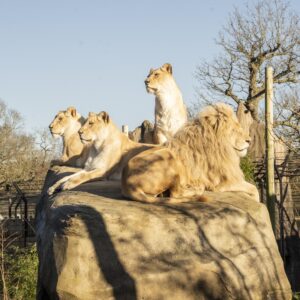On the 10th of August Lions take centre stage for World Lion Day to raise awareness for the conservation and protection of the species. There are two species of Lions, African Lions and Asiatic Lions named after their geographical locations.
Here at Paradise Wildlife Park, our history has been shaped by lions and one in particular changed the fate of the Zoo; Bobby. Bobby the lion was one of the animals present when the zoo was known as Broxbourne Zoo prior to the purchase by our founder Peter Sampson. In 1980, Broxbourne Zoo was known as ‘the worst zoo in the UK’ and was held in very low regard by the zoo community and public. Peter Sampson had originally come to look at the land to use as a place to store his coaches from his business. However, upon seeing Bobby the lion Peter Sampson was inspired to purchase the land and change from owning a coach company to running a zoo. Peter saw and knew that these animals deserved a better life and conditions and knew he could give this to them.
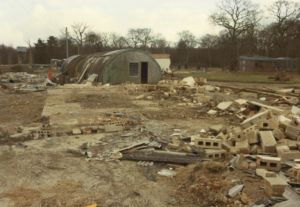 .
. 
When the zoo was purchased, Bobby the lion had lived in a very small enclosure and had never stepped on grass, Peter, his family and his team worked to change this immediately and was able to provide Bobby with a very spacious and lushes grass habitat for him to live out his final years in, witnessing Bobby walk on grass for the first time made the family realise that they could make a positive change for animals.
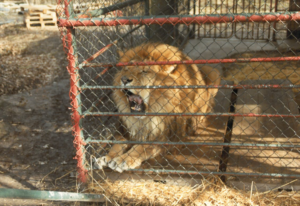 .
. 
Today we are Hertfordshire’s number one Zoo and home to a pride of four white lions. They are an incredible pride and love welcoming the visitors as they first enter our World of Animals! Did you know you can get up close to our lions and hand feed them as part of our Feed A Big Cat experience!
This will be our last white lion pride as the white fur colouring derives from a recessive gene and has previously been influenced to ensure genetic white cubs. This manipulation of breeding can bring medical implications and issues of interbreeding. As more information and knowledge over the years has been gained, the international community within good zoos has come to the understanding of where breeding needs to be to effectively protect the genetic gene pool of the species. As a good zoo we work with the community to protect and conserve a strong gene pool and agree with the change in breeding.
Our pride consists of our infamous Moto, the male, and Kya, Izulu and Zuri, the lionesses. They all have their own unique personalities and are loved across the park by the whole team and visitors. Moto loves to show off his territory calls and his roar can be heard all over the park throughout the day. He is incredibly handsome with a beautiful big mane, and his striking good looks make him a firm favourite with visitors. He doesn’t have a lot of time for play but when he does one of his favourite things is to roll around in a nice new smell that the keepers provide for enrichment, his absolute favourite is peppermint, he also enjoys ripping up cardboard boxes and playing with giant boomer balls.
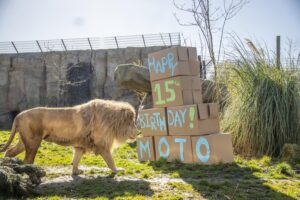
Kya is the queen of our lion pride, and has always been an amazing mum to Zuri and Izulu, and a wonderful partner to Moto. She always keeps a watchful eye on the pride, ensuring that Zuri doesn’t cause too much trouble and stepping in when needed. Despite her age, she still has a playful streak and enjoys playing with her daughters.
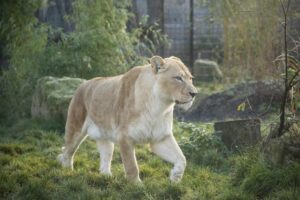
Izulu is generally the calmest in the pride, even though she has no biological connection with Moto they are both welcoming to each other. With Moto always being accepting of Izulu in his pride.
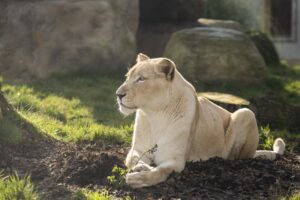
Zuri is the youngest member of the pride and is the biggest troublemaker! She became a ‘daddy’s girl’ very soon after meeting Moto properly when she was old enough and she likes to copy the things that he does, including modelling her territory call on his as she sounds very similar to him just not as loud! She is incredibly playful and will make a game out of anything given the opportunity, including pulling down newly fitted CCTV cameras and playing football with them!
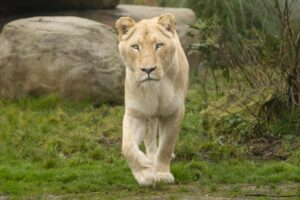
You can adopt our white lions here at the zoo with all money helping to support the conservation of lions in the wild. With estimated only around 20,000 lions left in the world due to human interference of habitat.
